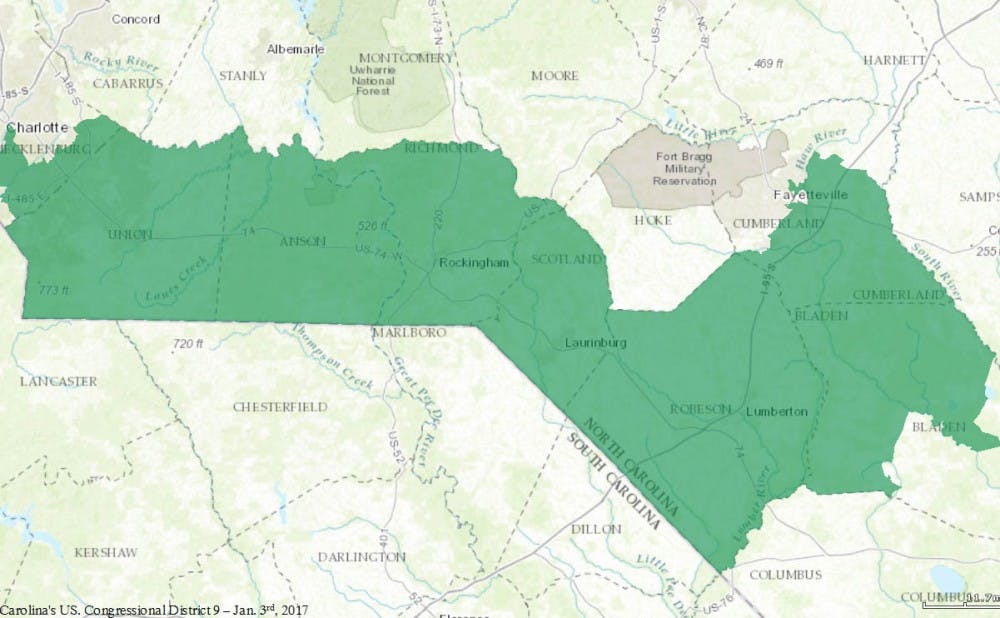On the night of Nov. 6, it looked clear that Republican Mark Harris had beaten his Democratic opponent Dan McCready, Trinity '05, in North Carolina’s 9th district by a margin just shy of 1,000 votes.
But Nov. 30, the North Carolina Board of Elections delayed certifying Harris to Congress due to “claims of irregularities and fraudulent activities related to absentee by-mail ballots” and, on a 7-2 vote, decided to hold a public investigative hearing by Dec. 21.
"The board does have the power to order a new election in the affected districts," said Mac McCorkle, professor of the practice in the Sanford School of Public Policy.
Harris criticized the elections board for lack of transparency and stated that the absentee voter irregularities were not widespread enough to change election results. However, he later added that he would support a new election if the board concluded the fraud was substantial enough to sway the previous race.
The State Board of Elections and Ethics Enforcement has already collected at least six sworn statements from rural Bladen County voters near the South Carolina border describing people coming to their doors to ask them to hand in their absentee ballots sometimes before they were even filled out or sealed. Some also received unrequested absentee ballots in the mail.
Only individual voters or designated close relatives may mail an absentee ballot, according to the board's website.
And some experts have noticed strange trends that may support the alleged voter fraud. For example, nearly one-eighth of the votes from Bladen County were recorded by mail, a greater percentage than that of all the other counties in the district. Despite that fact that only 19 percent of the ballots were requested by Republicans, 61 percent of ballots returned were for Harris.
Additionally, McCready won the mail-in absentee ballots by at least 16 points in every other county, regardless of which way the county's in-person voting had leaned. But with Bladen County's mail-in absentee ballots, Harris won by 24 points.
Authorities found some of the same discrepancies in the neighboring Robeson County, in which 64 percent of requested absentee ballots were not returned, amounting to 3,400 absentee ballots from both counties that were not mailed back.
Unreturned ballots were found to be disproportionately associated with minority voters in Bladen County and especially Robeson County, where 75 percent and 69 percent of mail-in ballots requested by African Americans and Native Americans, respectively, were unreturned.
McCorkle said that these statistics lead to two main concerns.
“[That] Democratic ballots were [either] being destroyed or… filled out for Harris," McCorkle said. "So, doctoring some and then destroying others. As of now, it remains unclear how many absentee ballots were allegedly doctored or destroyed."
Leslie McCrae Dowless, an independent contractor and convicted felon for insurance fraud, also worked for Harris' primary and general election campaign, was named a person of interest by the board with a suspicion that he played a role in the alleged fraud, according to NBC News. Dowless has denied wrongdoing.
Although the current state board is scheduled to dissolve Dec. 12, the investigation is set to continue. McCorkle noted that it is unclear what the board will do, but North Carolina's statutory legal standard doesn’t require board members to prove or estimate that the outcome could have been different. Instead the only requirement is to present enough evidence that the election process was “tainted” in some way.
"One implication of that is McCready might win from all of this," he said. "Another implication is, in policy terms, that we’ve opened up a new can of worms about the integrity of our election process and about absentee ballots.”
He also pointed out that this year’s controversy in the 9th district illuminated a different type of voter fraud than is traditionally discussed.
“Most of the attention has been on voter ID, on the people actually showing up at polls. But that seems illogical, doesn't it?” McCorkle said. “We're supposedly worried about massive voter fraud of people coming in, publicly lying and running the risk of getting pictured, getting caught right there—versus these absentee ballots that are much easier, you would think, to fake.”
Get The Chronicle straight to your inbox
Signup for our weekly newsletter. Cancel at any time.

Mona Tong is a Trinity senior and director of diversity, equity and inclusion analytics for The Chronicle's 117th volume. She was previously news editor for Volume 116.

